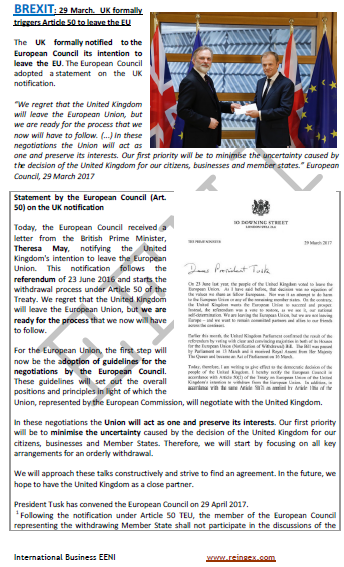BREXIT United Kingdom-European Union

UK departure from the EU (BREXIT) Economic Implications
- Introduction to the Brexit (the UK leaving the European Union)
- Economic and Political Implications of the BREXIT
- Chronology of the BREXIT
- New Settlement for the UK within the EU
- The BREXIT and the North Sea-Mediterranean Corridor (Ireland, France)
BREXIT (UK departure from the EU):

The objectives of the subject “BREXIT” are the following:
- To understand the causes of the BREXIT and its economic implications
- To analyze the BREXIT process
- To understand the New Settlement for the UK within the EU

The Subject “BREXIT (UK departure from the EU)” belongs to the following Online Programs taught by EENI Global Business School:
The BREXIT, or departure from the UK of the EU, occurred on 29 March 2017, when it was notified by letter to the European Council, based on the Article 50 of the Treaty on European Union (Voluntary and unilateral withdrawal clause), Its decision to leave the EU.
The President of the EU, the Polish Donald Tusk, said: “There is no reason to say that this is a happy day, neither in Brussels nor in London”.
In this way, the EU of twenty-eight members is now twenty-seven members.
The BREXIT has significant implications that generate uncertainties:
- Globally. The International Monetary Fund estimates that it could mean a loss of 0.1% in the world economy growth
- The EU.
- Since it loses one of its net contributors, in addition to being the second economy of the EU
- The European exporters will lose competitiveness in the UK market
- UK.
- For example, the UK will not be able to benefit from the numerous EU Free Trade Agreement and Association Agreements with Mexico, Georgia, Korea, Lebanon, Egypt, South Africa..
- The British companies will not form part of the European Single Market or the European Economic Area. Neither will they be part of the Customs Union with Turkey
- Even potential risks of internal rupture have been identified (Scotland, Northern Ireland)
- Many European companies will be able to benefit from the BREXIT, for example, in all the markets in which the EU has trade agreements in force since the UK will be excluded from all of them
- Two European agencies, the European Banking Authority and the European Medicines Agency, will no longer be in London
- The UK will surely cease to be a member of the Asia-Europe Meeting (ASEM) and many other EU-led Organizations
- The UK will no longer form part of the European Central Bank (ECB), the European Economic and Social Committee or the European Investment Bank, among others
- The Exporters from the third countries will no longer be able to benefit from the EU Generalized System of Preferences (GSP)
- Etc
(c) EENI Global Business School (1995-2024)
We do not use cookies
Top of this page




 or
or 

